18种特殊反义疑问句及练习
(完整word版)反义疑问句练习题(附答案).doc
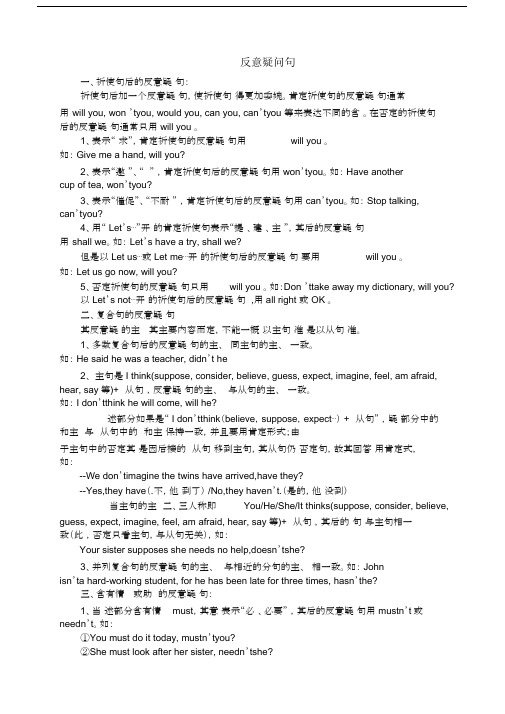
反意疑问句一、祈使句后的反意疑句:祈使句后加一个反意疑句,使祈使句得更加委婉。
肯定祈使句的反意疑句通常用will you, won ’tyou, would you, can you, can’tyou 等来表达不同的含。
在否定的祈使句后的反意疑句通常只用 will you 。
1、表示“ 求”,肯定祈使句的反意疑句用will you 。
如: Give me a hand, will you?2、表示“邀”、“ ” ,肯定祈使句后的反意疑句用 won’tyou。
如: Have anothercup of tea, won’tyou?3、表示“催促”、“不耐” ,肯定祈使句后的反意疑句用 can’tyou。
如: Stop talking,can’tyou?4、用“ Let’s⋯”开的肯定祈使句表示“提、建、主”,其后的反意疑句用shall we。
如: Let’s have a try, shall we?但是以 Let us⋯或 Let me⋯开的祈使句后的反意疑句要用will you 。
如: Let us go now, will you?5、否定祈使句的反意疑句只用will you 。
如:Don ’ttake away my dictionary, will you?以Let’s not⋯开的祈使句后的反意疑句 ,用 all right 或 OK 。
二、复合句的反意疑句其反意疑的主其主要内容而定,不能一概以主句准是以从句准。
1、多数复合句后的反意疑句的主、同主句的主、一致。
如: He said he was a teacher, didn’t he2、主句是 I think(suppose, consider, believe, guess, expect, imagine, feel, am afraid, hear, say等)+从句,反意疑句的主、与从句的主、一致。
如: I don’tthink he will come, will he?述部分如果是“ I don’tthink(believe,suppose,expect⋯) +从句” ,疑部分中的和主与从句中的和主保持一致,并且要用肯定形式;由于主句中的否定其是因后接的从句移到主句,其从句仍否定句,故其回答用肯定式,如:--We don’timagine the twins have arrived,have they?--Yes,they have(.不,他到了) /No,they haven’t.(是的,他没到)当主句的主二、三人称即You/He/She/It thinks(suppose, consider, believe, guess, expect, imagine, feel, am afraid, hear, say等)+从句,其后的句与主句相一致(此,否定只看主句,与从句无关),如:Your sister supposes she needs no help,doesn’tshe?3、并列复合句的反意疑句的主、与相近的分句的主、相一致。
英语20种特殊的反意疑问句
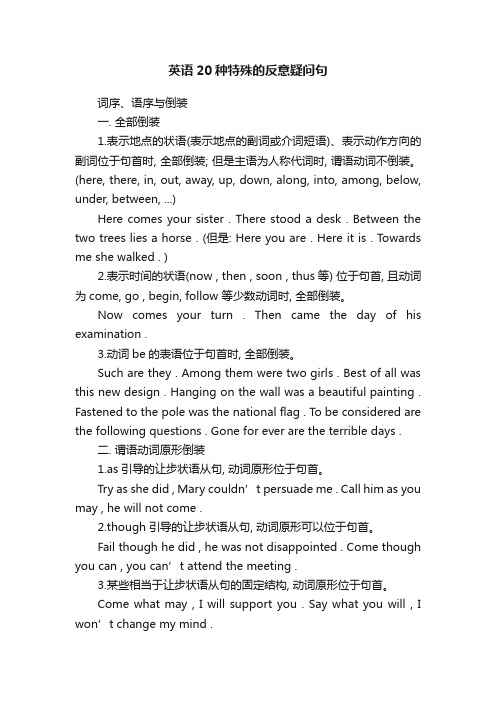
英语20种特殊的反意疑问句词序、语序与倒装一. 全部倒装1.表示地点的状语(表示地点的副词或介词短语)、表示动作方向的副词位于句首时, 全部倒装; 但是主语为人称代词时, 谓语动词不倒装。
(here, there, in, out, away, up, down, along, into, among, below, under, between, ...)Here comes your sister . There stood a desk . Between the two trees lies a horse . (但是: Here you are . Here it is . Towards me she walked . )2.表示时间的状语(now , then , soon , thus等) 位于句首, 且动词为come, go , begin, follow 等少数动词时, 全部倒装。
Now comes your turn . Then came the day of his examination .3.动词be的表语位于句首时, 全部倒装。
Such are they . Among them were two girls . Best of all was this new design . Hanging on the wall was a beautiful painting . Fastened to the pole was the national flag . To be considered are the following questions . Gone for ever are the terrible days .二. 谓语动词原形倒装1.as引导的让步状语从句, 动词原形位于句首。
Try as she did , Mary couldn’t persuade me . Call him as you may , he will not come .2.though引导的让步状语从句, 动词原形可以位于句首。
反义疑问句练习题目及答案
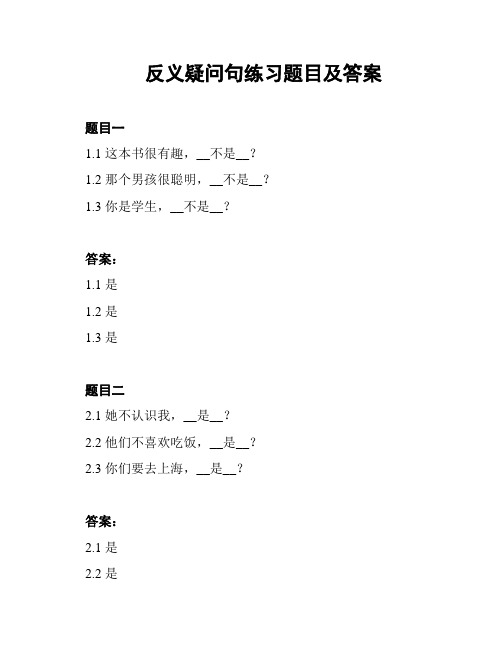
反义疑问句练习题目及答案题目一1.1 这本书很有趣,__不是__?1.2 那个男孩很聪明,__不是__?1.3 你是学生,__不是__?答案:1.1 是1.2 是1.3 是题目二2.1 她不认识我,__是__?2.2 他们不喜欢吃饭,__是__?2.3 你们要去上海,__是__?答案:2.1 是2.2 是2.3 是题目三3.1 他不喜欢看电视,__是__?3.2 你不觉得这个问题很有意思,__是__?3.3 她没去过北京,__是__?答案:3.1 是3.2 是3.3 是题目四4.1 他们不会唱歌,__是__?4.2 这是个好主意,__不是__?4.3 他喜欢看电影,__不是__?答案:4.1 是4.2 不是4.3 不是题目五5.1 她不懂汉语,__是__?5.2 你会游泳,__是__?5.3 他们喜欢吃饭,__是__?答案:5.1 是5.2 是5.3 是题目六6.1 这不是你的手机,__是__?6.2 你不喜欢这个颜色,__是__?6.3 他们会来参加聚会,__是__?答案:6.1 是6.2 是6.3 是题目七7.1 他没有听说过这个地方,__是__?7.2 你不想去旅行,__是__?7.3 她知道这个答案,__是__?答案:7.1 是7.2 是7.3 是题目八8.1 我今天晚上有时间,__不是__?8.2 他没有考试,__是__?8.3 你们都明白这个问题,__是__?答案:8.1 不是8.2 是8.3 是。
反义疑问句练习题及答案解析

反义疑问句练习题及答案解析反义疑问句是英语语法中的一种问句形式,用于在表达某种观点或态度时,征求对方的认同或否认。
反义疑问句通常由两个部分组成,主句和从句,其中主句陈述事实,并以逗号结尾,从句是对主句的反问。
以下是一些反义疑问句的练题及答案解析:1. He is a doctor, isn't he?答案:是解析:句子的主语是 "He",陈述了 "He" 是一个医生。
主句以逗号结尾,从句表达了 "He" 是一个医生这一观点,并征求对方的认同。
2. They don't like coffee, do they?答案:否解析:句子的主语是 "They",陈述了 "They" 不喜欢咖啡。
主句以逗号结尾,从句表达了 "They" 不喜欢咖啡这一观点,并征求对方的否认。
3. You can swim, can't you?答案:是解析:句子的主语是 "You",陈述了 "You" 能游泳。
主句以逗号结尾,从句表达了 "You" 能游泳这一观点,并征求对方的认同。
4. She hasn't finished her homework, has she?答案:否解析:句子的主语是"She",陈述了"She" 没有完成她的作业。
主句以逗号结尾,从句表达了 "She" 没有完成她的作业这一观点,并征求对方的否认。
5. He won't be late, will he?答案:否解析:句子的主语是 "He",陈述了 "He" 不会迟到。
主句以逗号结尾,从句表达了"He" 不会迟到这一观点,并征求对方的否认。
反义疑问句讲解与练习

反义疑问句讲解与练习一、含be(is, are, was, were)动词的反意疑问句(1)句型1:主语+ be+其它,isn’t(aren’t, wasn’t, weren’t)+ 主语?句型2:主语+ be not+其它,is(are, was, were) + 主语?① You are from America, aren’t you? Yes, I am. No, I’m not.② It isn’t very cold today, is it? Yes, it is. No,it isn’t.(2)注意:There be句型例:There is an old picture on the wall, isn’t there?二、带行为动词反意疑问句(不含be和情态动词)句型1:主语+动词+其他,do/did/does + not +主语?句型2:主语+did/does/do+not +动词原形+其他,did/do/does+其他?例:You often watch TV in the evening, don’t you? Yes, I do. No, I don’t.三、含有情态动词的反意疑问句,反义疑问句中的动词使用情态动词。
例:The students must study hard, mustn’t they? Yes, they must. No, they needn’t.注意:You must go home now, needn’t you? Yes, I must. No, I needn’t.★注意:There be句型的一般将来时① There will be a basketball match tomorrow, won’t there?Yes, there will. No, there won’t.② There won’t be too much pollution in the future, will there?Yes, there will. No, there won’t.四、反义疑问句的回答:答语要和实际情况相符合,遵循“实事求是”的原则。
25种反义疑问句的特殊用法及练习2022届高考英语二轮专题
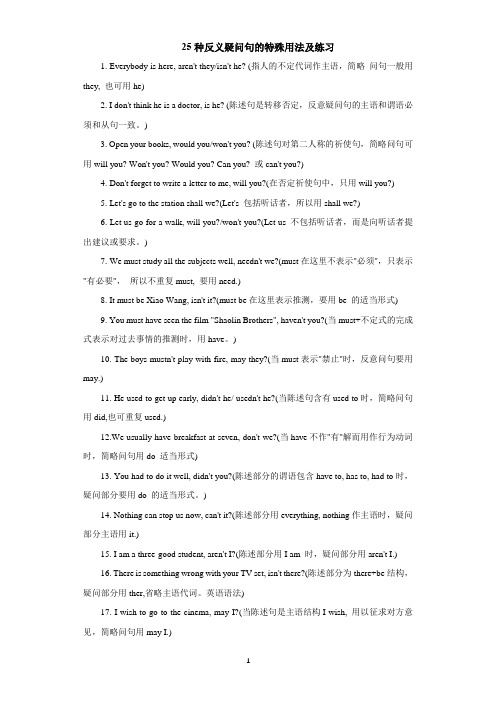
25种反义疑问句的特殊用法及练习1. Everybody is here, aren't they/isn't he? (指人的不定代词作主语,简略问句一般用they, 也可用he)2. I don't think he is a doctor, is he? (陈述句是转移否定,反意疑问句的主语和谓语必须和从句一致。
)3. Open your books, would you/won't you? (陈述句对第二人称的祈使句,简略问句可用will you? Won't you? Would you? Can you? 或can't you?)4. Don't forget to write a letter to me, will you?(在否定祈使句中,只用will you?)5. Let's go to the station shall we?(Let's 包括听话者,所以用shall we?)6. Let us go for a walk, will you?/won't you?(Let us 不包括听话者,而是向听话者提出建议或要求。
)7. We must study all the subjects well, needn't we?(must在这里不表示"必须",只表示"有必要",所以不重复must, 要用need.)8. It must be Xiao Wang, isn't it?(must be在这里表示推测,要用be 的适当形式)9. You must have seen the film "Shaolin Brothers", haven't you?(当must+不定式的完成式表示对过去事情的推测时,用have。
初中英语反意疑问句30题
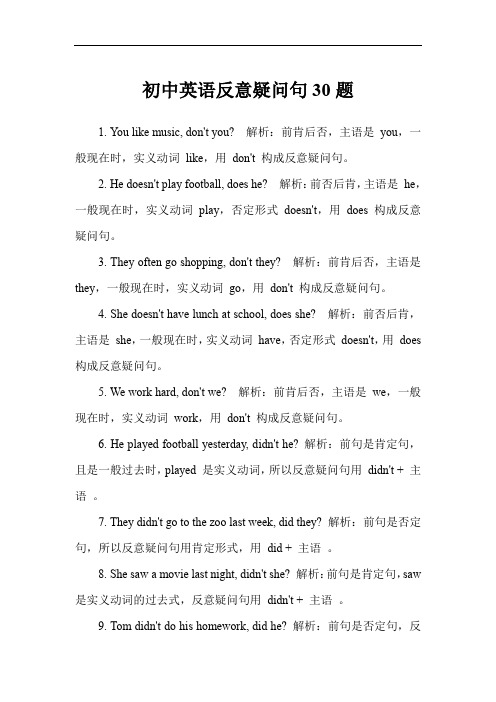
初中英语反意疑问句30题1. You like music, don't you? 解析:前肯后否,主语是you,一般现在时,实义动词like,用don't 构成反意疑问句。
2. He doesn't play football, does he? 解析:前否后肯,主语是he,一般现在时,实义动词play,否定形式doesn't,用does 构成反意疑问句。
3. They often go shopping, don't they? 解析:前肯后否,主语是they,一般现在时,实义动词go,用don't 构成反意疑问句。
4. She doesn't have lunch at school, does she? 解析:前否后肯,主语是she,一般现在时,实义动词have,否定形式doesn't,用does 构成反意疑问句。
5. We work hard, don't we? 解析:前肯后否,主语是we,一般现在时,实义动词work,用don't 构成反意疑问句。
6. He played football yesterday, didn't he? 解析:前句是肯定句,且是一般过去时,played 是实义动词,所以反意疑问句用didn't + 主语。
7. They didn't go to the zoo last week, did they? 解析:前句是否定句,所以反意疑问句用肯定形式,用did + 主语。
8. She saw a movie last night, didn't she? 解析:前句是肯定句,saw 是实义动词的过去式,反意疑问句用didn't + 主语。
9. Tom didn't do his homework, did he? 解析:前句是否定句,反意疑问句用肯定形式did + 主语。
反意疑问句-18
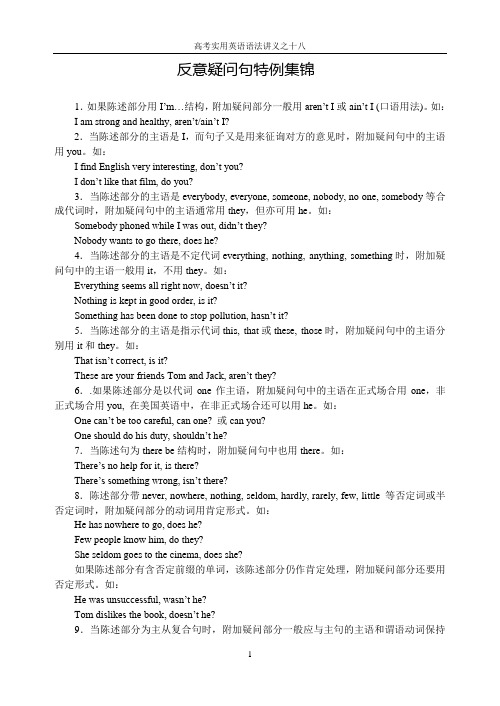
反意疑问句特例集锦1.如果陈述部分用I’m…结构,附加疑问部分一般用aren’t I或ain’t I (口语用法)。
如:I am strong and healthy, aren’t/ain’t I?2.当陈述部分的主语是I,而句子又是用来征询对方的意见时,附加疑问句中的主语用you。
如:I find English very interesting, don’t you?I don’t like that film, do you?3.当陈述部分的主语是everybody, everyone, someone, nobody, no one, somebody等合成代词时,附加疑问句中的主语通常用they,但亦可用he。
如:Somebody phoned while I was out, didn’t they?Nobody wants to go there, does he?4.当陈述部分的主语是不定代词everything, nothing, anything, something时,附加疑问句中的主语一般用it,不用they。
如:Everything seems all right now, doesn’t it?Nothing is kept in good order, is it?Something has been done to stop pollution, ha sn’t it?5.当陈述部分的主语是指示代词this, that或these, those时,附加疑问句中的主语分别用it和they。
如:That isn’t correct, is it?These are you r friends Tom and Jack, aren’t they?6..如果陈述部分是以代词one作主语,附加疑问句中的主语在正式场合用one,非正式场合用you, 在美国英语中,在非正式场合还可以用he。
反义疑问句(含解析、例句及详尽用法)
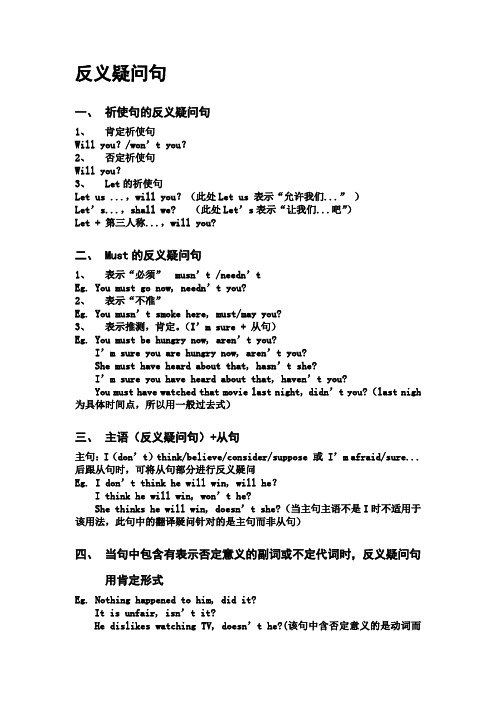
反义疑问句一、祈使句的反义疑问句1、肯定祈使句Will you?/won’t you?2、否定祈使句Will you?3、Let的祈使句Let us ...,will you?(此处Let us 表示“允许我们...”)Let’s...,shall we? (此处Let’s表示“让我们...吧”)Let + 第三人称...,will you?二、Must的反义疑问句1、表示“必须” musn’t /needn’tEg. You must go now, needn’t you?2、表示“不准”Eg. You musn’t smoke here, must/may you?3、表示推测,肯定。
(I’m sure + 从句)Eg. You must be hungry now, aren’t you?I’m sure you are hungry now, aren’t you?She must have heard about that, hasn’t she?I’m sure you have heard about that, haven’t you?You must have watched that movie last night, didn’t you?(last nigh 为具体时间点,所以用一般过去式)三、主语(反义疑问句)+从句主句:I(don’t)think/believe/consider/suppose 或 I’m afraid/sure...后跟从句时,可将从句部分进行反义疑问Eg. I don’t think he will win, will he?I think he will win, won’t he?She thinks he will win, doesn’t she?(当主句主语不是I时不适用于该用法,此句中的翻译疑问针对的是主句而非从句)四、当句中包含有表示否定意义的副词或不定代词时,反义疑问句用肯定形式Eg. Nothing happened to him, did it?It is unfair, isn’t it?He dislikes watching TV, doesn’t he?(该句中含否定意义的是动词而非副词或不定代词,因此不适用于该用法,反义疑问句仍然使用否定形式)五、反义疑问句的回答反义疑问句的回答针对被提问部分的谓语动词,且与回答句前部分的Yes和No 保持一致Eg. A: You haven’t lost the ticket, have you?B: D I know it’s hard to get another one at this moment.A. Yes, I haven’tB. No, I haveC. I hope soD. I’m afraid not六、陈述部分的主语与反义疑问句主语保持一致的情况1、OneEg. One can’t be too careful when driving a car, can one/he?一个人在开车的时候再怎么小心也不为过。
反义疑问句讲解及练习
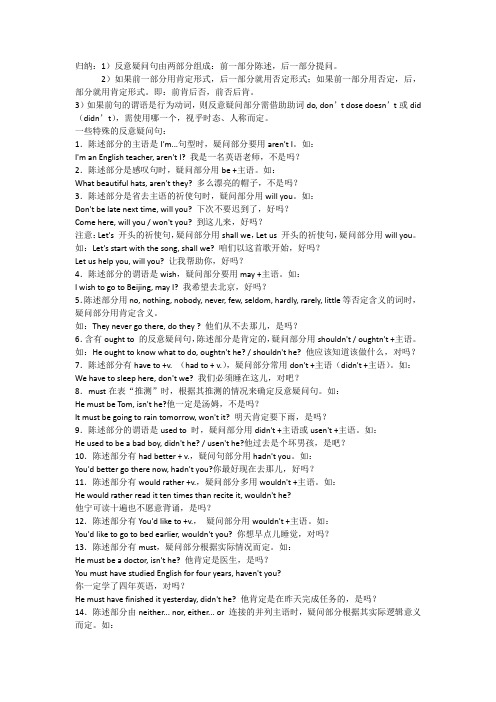
归纳:1)反意疑问句由两部分组成:前一部分陈述,后一部分提问。
2)如果前一部分用肯定形式,后一部分就用否定形式;如果前一部分用否定,后,部分就用肯定形式。
即:前肯后否,前否后肯。
3)如果前句的谓语是行为动词,则反意疑问部分需借助助词do, don’t dose doesn’t或did (didn’t),需使用哪一个,视乎时态、人称而定。
一些特殊的反意疑问句:1.陈述部分的主语是I'm...句型时,疑问部分要用aren't I。
如:I'm an English teacher, aren't I? 我是一名英语老师,不是吗?2.陈述部分是感叹句时,疑问部分用be +主语。
如:What beautiful hats, aren't they? 多么漂亮的帽子,不是吗?3.陈述部分是省去主语的祈使句时,疑问部分用will you。
如:Don't be late next time, will you? 下次不要迟到了,好吗?Come here, will you / won't you? 到这儿来,好吗?注意:Let's 开头的祈使句,疑问部分用shall we,Let us 开头的祈使句,疑问部分用will you。
如:Let's start with the song, shall we? 咱们以这首歌开始,好吗?Let us help you, will you? 让我帮助你,好吗?4.陈述部分的谓语是wish,疑问部分要用may +主语。
如:I wish to go to Beijing, may I? 我希望去北京,好吗?5.陈述部分用no, nothing, nobody, never, few, seldom, hardly, rarely, little等否定含义的词时,疑问部分用肯定含义。
如:They never go there, do they ?他们从不去那儿,是吗?6.含有ought to 的反意疑问句,陈述部分是肯定的,疑问部分用shouldn't / oughtn't +主语。
史上最全最有方法的反义疑问句讲解及练习
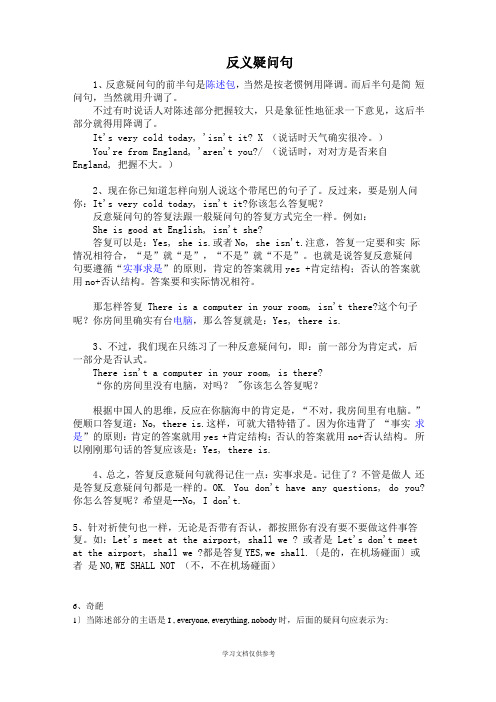
反义疑问句1、反意疑问句的前半句是陈述包,当然是按老惯例用降调。
而后半句是简短问句,当然就用升调了。
不过有时说话人对陈述部分把握较大,只是象征性地征求一下意见,这后半部分就得用降调了。
It's very cold today, 'isn't it? X (说话时天气确实很冷。
)You're from England, 'aren't you?/ (说话时,对对方是否来自England, 把握不大。
)2、现在你已知道怎样向别人说这个带尾巴的句子了。
反过来,要是别人问你:It's very cold today, isn't it?你该怎么答复呢?反意疑问句的答复法跟一般疑问句的答复方式完全一样。
例如:She is good at English, isn't she?答复可以是:Yes, she is.或者No, she isn't.注意,答复一定要和实际情况相符合,“是”就“是”,“不是”就“不是”。
也就是说答复反意疑问句要遵循“实事求是”的原则,肯定的答案就用yes +肯定结构;否认的答案就用no+否认结构。
答案要和实际情况相符。
那怎样答复 There is a computer in your room, isn't there?这个句子呢?你房间里确实有台电脑,那么答复就是:Yes, there is.3、不过,我们现在只练习了一种反意疑问句,即:前一部分为肯定式,后一部分是否认式。
There isn't a computer in your room, is there?“你的房间里没有电脑,对吗? "你该怎么答复呢?根据中国人的思维,反应在你脑海中的肯定是,“不对,我房间里有电脑。
” 便顺口答复道:No, there is.这样,可就大错特错了。
因为你违背了“事实求是”的原则:肯定的答案就用yes +肯定结构;否认的答案就用no+否认结构。
反义疑问句讲解及答案

反义疑问句讲解及答案反义疑问句是一种附加疑问句,用于表示提问人的不确定或需要对方证实的看法。
这种句型由两部分组成,即陈述句和简短的疑问句,两部分的人称时态应保持一致。
陈述部分为肯定式时,疑问部分为否定式,反之亦然。
例如,昨天她病了,是吗?你没去,是吧?在特殊情况下,祈使句也可以构成反义疑问句。
通常情况下,祈使句后会加上will you或won't you,用于表示请求或提醒对方注意。
当祈使句以Let开头时,反义疑问句有两种情况:以shall we或shan't we结尾,或以will you或won't you结尾。
例如,回家吧,好吗?让我试一试,行吗?当陈述部分含有I think (believe。
suppose。
)that。
结构时,反义疑问句的主语必须是第一人称,并且须与从句的主、谓语保持一致。
如果是非第一人称,则反义疑问句的主语应与主句的主语相一致。
当陈述部分为I(We) don’t think(believe。
suppose。
consider)+that从句时,问句部分的动词和主语仍与that从句保持一致且用肯定式。
例如,我认为他不会来,对吗?他认为她会来,不是吗?我们不相信这个消息是真的,是吗?When using a statement in the form of subject + said (told。
reported。
asked。
) + that clause for a tag n。
the verb and subjectof the n part should agree with those of the main clause。
For example:①They said that you had finished your work。
didn't they。
(Not "hadn't you?")②Kate told you that she would go there。
反义疑问句题目

反义疑问句题目
一、日常生活类
1. 你今天吃了好多冰淇淋,这对胃可不好,不是吗?
2. 他总是在睡觉,简直就是个瞌睡虫,不是吗?
3. 她每次逛街都要花好多钱,是个购物狂啊,不是吗?
4. 你刚刚说要减肥,可又吃了一大块蛋糕,不是吗?
5. 那只小狗超级可爱,每个人见了都会喜欢它,不是吗?
二、校园生活类
1. 小明数学考试总是不及格,他得好好努力学习数学了,不是吗?
2. 小红在课堂上老是讲话,这是违反纪律的,不是吗?
3. 老师布置的作业超级多,大家都觉得压力山大,不是吗?
4. 学校食堂的饭菜有时候很难吃,大家都这么说,不是吗?
5. 这个学霸每次考试都名列前茅,真的很厉害,不是吗?
三、娱乐类
1. 那部电影超级无聊,看的时候都想打瞌睡,不是吗?
2. 这个歌手的嗓音很独特,一听就忘不了,不是吗?
3. 那部电视剧的剧情太拖沓了,看得人很着急,不是吗?
4. 这个综艺节目总是有很多笑点,大家看的时候都笑得停不下来,不是吗?
5. 那个明星的演技很糟糕,演什么都一个样,不是吗?。
反意疑问句的特殊情形30例

反意疑问句的特殊情形30例反义疑问句的形式:反意疑问句是附加在陈述句之后, 对所陈述内容提出质疑或通过反问以强化陈述内容的一种疑问句。
总体原则:如果陈述部分是肯定的, 附加部分用否定形式;如果陈述部分是否定的, 附加部分用肯定形式。
附加部分的助动词和代词应与陈述部分一致。
例如:They are students , aren't they ?They aren't students , are they ?特殊情况小结:1. 在由“祈使句+ 疑问部分” 构成的反意疑问句中,疑问部分通常用will youPass me the dictionary , will you ? 把词典递给我好吗?Don’t do that again , will you ? 别再做那件事好吗?应特别注意带有主语的祈使句。
例如:——Alice , you feed the bird today , will you ?——But I fed it yesterday.2. 在含有let的祈使句后的反意疑问部分,如果let的宾语us包括听者(常写成let’s)时用shall we ;不包括听者(常写成let us)时用will you 。
Let的宾语是me时, 要根据意思用will you或may I 。
let的宾语是第三人称时用will you。
例如:Let’s go for a walk , shall we ? 我们去散步好吗?Let us do it by ourselves , will you ? 让我们自己做这件事好吗?Let me have a look at your photo , will you ? (你)让我看看你的照片好吗?Let him speak first , will you ? (你)让他先说好吗?3. 当陈述部分含有must 时, 要注意must 的含义。
表示"一定要, 必须"时, 反意疑问句附加部分用 mustn't 或 needn't。
反义疑问句详解及练习题(带答案)

反义疑问句详解及练习题(带答案)反义疑问句的用法1.定义:反义疑问句,表示说话人提出看法、建议或意见,问对方同意与否。
2.结构:有两部分组成,前一部分为陈述形式,后一部分为疑问句。
3.形式:前肯后否与前否后肯。
Lucy isn“t beautiful, is she?露西不幽美,是吗?Li Ming is pretty handsome, isn“t he?黎明相当帅,不是吗?4.回答:肯定回答:“Yes+肯定结构”,否定回答“No+否定结构”,但是注意“Yes”要译为“不”,“No”要译为“是”。
-Your sister is a teacher, isn“t she?你妹妹是老师,不是吗?-Yes, she is.不,她是老师。
-You can play the guitar, can“t you?你会弹吉他,不是吗?-No, I can“t.是的,我不会。
特别注意:1)当陈述部分为否定式,反意疑问句为肯定式时,其回答往往与汉语不一致“It isn’t cheap, is it?“ “Yes, it is.““它不省钱吧?”“不,很省钱。
”“He doesn’t love her, does he?“ “No, he doesn’t.““他不爱她,是吗?”“是的,他不爱她。
”此时,“Yes“即不,对前面“It isn“t cheap.“的否定。
否定反意疑问句的回答当陈述部分为肯定式,反意疑问句为否定式时,其回答大凡不会造成困难,大凡只需照情况回答即可:“It’s new, isn’t it?“ “Yes, it is.““是新的,对吗?”“对,是新的。
”“H e wants to go, doesn’t he?“ “No, he doesn’t.““他想去,对吗?”“不,他不想去。
”此时,“Yes“即是,对前面“It“s new.“的肯定。
2)像disagree,dislike,unhappy这类带有否定前缀后缀的单词,用在句中时,句子仍然视为肯定句,而其反意疑问句采用否定结构如:He disagreed with you, didn“t he?She is unhappy now,isn“t she?5.反义疑问句的类型:(1)、be型eg: The weather is fine, isn“t it?天气很好,不是吗?The dress isn“t blue, is it?那件裙子不是蓝色的,是吗?(2)、助动词型Tom has a basketball, doesn“t he?汤姆有一个篮球,不是吗?Your father often doesn“t get up at six thirty, does he?你爸爸通常不在六点半起床,是吗?You want to be an artist when you grow up, don“t you?当你长大后你想当一名艺术家,不是吗?All the students don“t like wearing the school uniform, do they?所有的学生都不喜欢在学校穿校服,是吗?(3)、情态动词型You will go to Beijing, won“t you?你将去北京,不是吗?My son can“t work out this question, can he?我儿子不会做这道题,是吗?随堂练习1. Linda ate nothing this morning, ___?A. didn’tsheB. was sheC. did sheD. wasn’t she2. There’s hardly___ milk in the bottle, _____there?A. no, isn’tB. some, isC. little, isn’tD. any, is3. He has never ridden a horse before, ___?A. does heB. has heC. hasn’t heD. doesn’t he4.—He seldom came here, _____?—Yes sir.A. didn’t heB. does heC. doesn’t heD. did he5. Everything seems all right, _____ ?A. does itB. don’t theyC. won’t itD. doesn’t it6. One can’t be too modest, can _____ ?A. oneB. heC. itD. we7. No one failed in the exam, _____ ?A. was heB. did oneC. did theyD. didn’t he8. Neither you nor I am an artist, _____ ?A. am IB. aren’t weC. are we9. He can’t be her father, _____ he?A. isB. isn’tC. canD. can t’10. They have no time to visit the museum, _____?A. do theyB. haven’t theyC. don’t theyD. will they11. You’d better go at once, _____ you?A. hadn’tB. didC. didn’tD. don’t12. You’d rather work than play, _____ you?A. hadn’tB. wouldn’tC. didn’tD. mustn’t13. You dare not do that, _____ you?A. don’tB. doC. dareD. daren’t14. He dislikes the two subjects, _____ he?A. doesB. doesn’tC. is15. These tools are useless now, _____ ?A. are theyB. aren’t theyC. is itD. isn’t it16. He used to get up at 6:30, _____ he?A.didn’t heB. did heC. used heD. wouldn’t he17. He ought to win the first prize, _______ he?A. mustn’tB. oughtn’tC. shouldn’tD. Both B and C.18. Let’s go there by bus, ___?A. will youB. shall weC. don’t youD. will you19. Let us go to play football, ___?A. will youB. shall weC. do weD. are we20. Don’t forget to give Polly some food and change her water, ___?A. will youB. shall weC. won’t you典题精析. 1-5 CDBDD 6-10 ACCAA 11-15 ABCBB 16-20 ADBAA。
反意疑问句特殊情况30例

反意疑问句特殊情况30例反义疑问句的形式:反意疑问句是附加在陈述句之后, 对所陈述内容提出质疑或通过反问以强化陈述内容的一种疑问句。
总体原则:如果陈述部分是肯定的, 附加部分用否定形式;如果陈述部分是否定的, 附加部分用肯定形式。
附加部分的助动词和代词应与陈述部分一致。
例如:They are students , aren't they ?They aren't students , are they ?特殊情况小结:1. 在由“祈使句+ 疑问部分” 构成的反意疑问句中,疑问部分通常用will youPass me the dictionary , will you ? 把词典递给我好吗?Don’t do that again , will you ? 别再做那件事好吗?应特别注意带有主语的祈使句。
例如:——Alice , you feed the bird today , will you ?——But I fed it yesterday.)时用2. 在含有let的祈使句后的反意疑问部分,如果let的宾语us包括听者(常写成let’sshall we ;不包括听者(常写成let us)时用will you 。
Let的宾语是me时, 要根据意思用will you或may I 。
let的宾语是第三人称时用will you。
例如:Let’s go for a walk , shall we ? 我们去散步好吗?Let us do it by ourselves , will you ? 让我们自己做这件事好吗?Let me have a look at your photo , will you ? (你)让我看看你的照片好吗?Let him speak first , will you ? (你)让他先说好吗?3. 当陈述部分含有must 时, 要注意must 的含义。
表示"一定要, 必须"时, 反意疑问句附加部分用mustn't 或needn't。
反义疑问句用法及练习题(附答案)

反义疑问句用法及练习题(附答案)反意疑问句用法及练习反意疑问句是指提出情况或者看法,询问对方同意不同意。
这种问句由两部分组成,前一部分是陈述句的形式,后一部分是附着在前一部分上的简短问句,前后两部分要构成反意疑问关系。
又分为两种情况:(1)前一部分为肯定形式,后一部分要为否定形式,即“前肯后否”的形式;或(2)前一部分为否定形式,后一部分则为肯定形式,即“前否后肯”的形式。
具体句式如下:1.0 前肯后否He is a pupil, isn’t he?You are a teacher, aren’t you?We are here, aren’t we?He likes English, doesn’t he?You like English, don’t you?They like English, don’t they?We shall go to the cinema, shan’t we?2.0 前否后肯He isn’t a pupil, is he?You aren’t a teacher, are you?They won’t go to the park tomorrow, will they?I am not a teacher, am I?You haven’t done your homework, have you?3.0陈述部分主、谓语是I am…时,3.1陈述句为肯定句时,反意疑问句用aren't I 或ain't I, 而不是am not I (可用am I not),例如:I'm as tall as your sister, aren't I?I am a doctor, aren’t I?或I am a doctor, ain't I? (慎用)反意问句为否定式时通常要缩写(若不缩写则用较正式的am I not),而am not在标准英语中又没有相应的缩写式,所以人们便用aren’t 来代之。
反义疑问句特殊情况总结

反义疑问句特殊情况总结1. Let’s go shopping, shall we?2. Let us go shopping, will you?3. Sit here please, will you?4. Don’t sit here, will you?5. I don’t think you are a doctor, are you?We believe she can do it better, can’t she?(当主句谓语动词是think, believe, suppose, expect, imagine等时,疑问部分应与宾语从句相对应来构成反义疑问句并注意否定转移)6. There is a book on the desk, isn’t there?7. He hardly eats meat, does he?He has no money to buy what he wants, does he?(当陈述部分用no, not, nothing, nobody, never, none, scarcely, few, seldom, hardly, rarely, little, no one, neither等否定含义的词时,其陈述部分应按否定来对待)8. You’d better go home right now, hadn’t you?9. You used to be afraid of dark, didn’t you?或:You used to be afraid of dark, usedn’t you?10. 关于must的反义疑问句①当must表推测时,疑问部分要根据must之后的动词采用相应的反问形式。
He must be good at English, isn’t he?They must play basketball very well, do they?②当must have done表示对过去的推测时,并且句中有明确的过去时间状语时,疑问部分应以一般过去时态的标准来构成反义疑问句;当must have done强调动作的完成并没有明确的过去时间状语时,疑问部分应按照现在完成时态的标准来反问。
18种特殊反义疑问句及练习
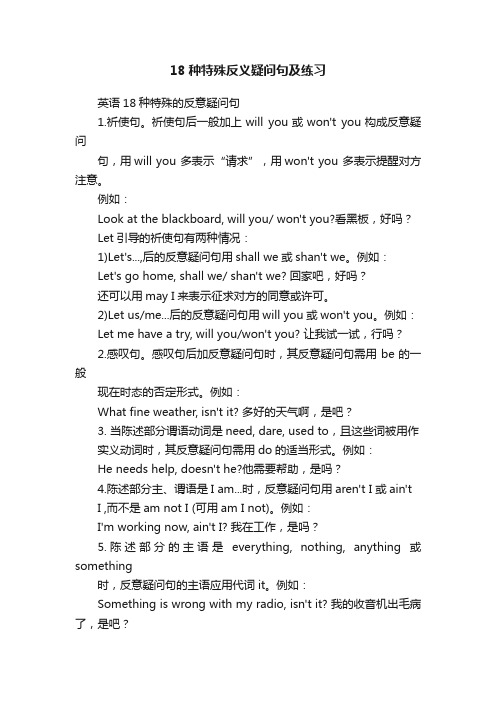
18种特殊反义疑问句及练习英语18种特殊的反意疑问句1.祈使句。
祈使句后一般加上will you或won't you构成反意疑问句,用will you 多表示“请求”,用won't you 多表示提醒对方注意。
例如:Look at the blackboard, will you/ won't you?看黑板,好吗?Let引导的祈使句有两种情况:1)Let's...,后的反意疑问句用shall we或shan't we。
例如:Let's go home, shall we/ shan't we? 回家吧,好吗?还可以用may I来表示征求对方的同意或许可。
2)Let us/me...后的反意疑问句用will you或won't you。
例如:Let me have a try, will you/won't you? 让我试一试,行吗?2.感叹句。
感叹句后加反意疑问句时,其反意疑问句需用be的一般现在时态的否定形式。
例如:What fine weather, isn't it? 多好的天气啊,是吧?3. 当陈述部分谓语动词是need, dare, used to,且这些词被用作实义动词时,其反意疑问句需用do的适当形式。
例如:He needs help, doesn't he?他需要帮助,是吗?4.陈述部分主、谓语是I am...时,反意疑问句用aren't I 或ain'tI ,而不是am not I (可用am I not)。
例如:I'm working now, ain't I? 我在工作,是吗?5.陈述部分的主语是everything, nothing, anything或something时,反意疑问句的主语应用代词it。
例如:Something is wrong with my radio, isn't it? 我的收音机出毛病了,是吧?6.陈述部分的主语是 everybody, everyone, anybody, anyone,somebody, someone, nobody, no one, none, neither 时, 其反意疑问句的主语需用复数代词they。
反义疑问句

特殊的反义疑问句1.Sit down and have a cup of tea ,will you? \ won't you ?Don't be late again, will you ?2.Let's have a rest, shall we? \ shan't we? \ OK?Let us go home now, will you? \won't you?Let meLet him3.What a beautiful girl ,isn't she ?4.I'm quite tall, aren't I?5.Something is wrong with my radio, isn't it?Nothing is serious, is it ?6.Everybody likes Beijing, don't they?Nobody wants to go swimming , does he ? \ do thay ?Neither of them is right, is he ? \ are they ?7.This is my ruler, isn't it ?Those are their books , aren't they ?8.One should do one's duty, shouldn't one?One cannot always do one's duty , can you ?9.What you need is more practice, isn't it ?To learn English well isn't easy ,is it ?Swimming is great fun, isn't it ?10.I wish to go home ,may I ?I wish I were you , may I ?11.He said that it was worth doing ,didn't he ?She said that her father had gone to America , didn't she ?I think he will be back in an hour , won't he ?I don't suppose you are serious , are you ?12.We must study English hard or we can't be good at it , can we ?He is a teacher but his wife is a nurse , isn't she ?13 当must 表示“必须”时,He must work hard next term , mustn't he ?当must 表示“必要”时,They must renew the books , needn't they ?当must 表示“推测”时,She must be very tired , isn't she ?You must have been to Huangshan ,haven't you ?14.You'd better come back early ,hadn't you ? \ shouldn't you ?You'd like to go there , wouldn't you ?You'd rather15.--Tom told me he saw a ghost last night ?-- He did , did he ?-- You mustn't listen to his story .-- Oh , I mustn't , mustn't I ?主谓一致一,谓语动词用单数1.either, neither ,one ,each (of) ,every (of) ,作主语或修饰主语时E.g. Every silver knife ,fork ,spoon has to be counted .2. everybody ,everyone ,everything ,no one ,no body ,anyone等不定代词,what ,whoever 等作主语3.不定式,动名词,从句作主语时谓语动词单数To see is to believe .Singing and dancing are their greatest pleasure .4.国家,机构,书刊,事件名称等作主语:The United Nations was founded in 1945.5.并列主语指同一事物时Ice cream and cake is what she wants after dinner .6.many a + 单数名词(表示许多)Many a student wants to apply for the scholarship .7.mathematics ,measles ,physics ,politics ,news二.谓语动词用复数1.both, few, many, several ,a number of ,the majority of 作主语或修饰主语2.用and 或both...and...连接的两个不同事物The manager and the secretary of the firm are very able man .The editor and publisher of the newspaper is a very able man .3.某些集合名词:few ,people ,the rest ,cattle ,police 等作主语4.正式语中,one of those + 复数名词+ 定从(谓语复数) Jane is one of those persons who always think they are right.the only one of +单数名词+ 定从(谓语单数)三.谓语动词有时单数有时复数1.a good many ,a number of + 复数名词a good deal + U2.family ,army ,class ,crowd ,herd ,public ,group, party ,committee, company ,government ,team等表整体--单数表成员--复数Class 2 is having English class . Class 2 are playing on the sports ground.3.Chinese ,Japanese ,English , French 指语言-- 单数指人民-- 复数4.时间,金钱,距离,体积等作主语---V.单数Twenty dollars is too expensive .表具体的、个别的单位--复数The last two years have been very difficult for us .真题1.In the coming summer holidays,my family ___ going to take a one-week trip to Qingdao.A.isB.areC.wasD.were2.___ pretty your dress is !Where did you get it ?A.HowB.How aC.WhatD.What a3.--There is enough food for the birds ,isn't ____?--No. We need to get some.A.itB.thereC.thatD.this4.--Your monitor id never late for school , is he ?--____.He always comes to school earlier than others .A.Yes ,he is .B.No,he isn'tC.Yes,of courseD.No,sometimes5.--_____ ?--He thinks China is great .A.What does your father think of China ?B.What does your father like in China ?C.Does your father like China ?6.--The film "Hoot"(拯救猫头鹰)is on at the movies .Let's go to see it ,____?--Ok. Let's go .A.will youB.shall weC.won;t weD.don;t you7.Lily is away .She ,with her mother ,____ to Zhalong to see birds .A.has goneB.have goneC.has been8.-- How many teachers are there in your school ?-- About 200. One third of them ___ men teachers.A.haveB.hasC.areD.is9.In our school library there ___a number of books on science and the number of them___growing larger and larger .A.is; areB.are; isC.has ;isD.have ;are10.Nothing is difficult in the world if you put your heart into it ,_____?A.aren't theyB.isn't itC.are theyD.is it。
- 1、下载文档前请自行甄别文档内容的完整性,平台不提供额外的编辑、内容补充、找答案等附加服务。
- 2、"仅部分预览"的文档,不可在线预览部分如存在完整性等问题,可反馈申请退款(可完整预览的文档不适用该条件!)。
- 3、如文档侵犯您的权益,请联系客服反馈,我们会尽快为您处理(人工客服工作时间:9:00-18:30)。
英语18种特殊的反意疑问句1.祈使句。
祈使句后一般加上will you或won't you构成反意疑问句,用will you 多表示“请求”,用won't you 多表示提醒对方注意。
例如:Look at the blackboard, will you/ won't you?看黑板,好吗?Let引导的祈使句有两种情况:1)Let's...,后的反意疑问句用shall we或shan't we。
例如:Let's go home, shall we/ shan't we? 回家吧,好吗?还可以用may I来表示征求对方的同意或许可。
2)Let us/me...后的反意疑问句用will you或won't you。
例如:Let me have a try, will you/won't you? 让我试一试,行吗?2.感叹句。
感叹句后加反意疑问句时,其反意疑问句需用be的一般现在时态的否定形式。
例如:What fine weather, isn't it? 多好的天气啊,是吧?3. 当陈述部分谓语动词是need, dare, used to,且这些词被用作实义动词时,其反意疑问句需用do的适当形式。
例如:He needs help, doesn't he?他需要帮助,是吗?4.陈述部分主、谓语是I am...时,反意疑问句用aren't I 或ain'tI ,而不是am not I (可用am I not)。
例如:I'm working now, ain't I? 我在工作,是吗?5.陈述部分的主语是everything, nothing, anything或something时,反意疑问句的主语应用代词it。
例如:Something is wrong with my radio, isn't it? 我的收音机出毛病了,是吧?6.陈述部分的主语是 everybody, everyone, anybody, anyone,somebody, someone, nobody, no one, none, neither 时, 其反意疑问句的主语需用复数代词they。
例如:Everyone is here, aren't they? 大家都到了,是吗?No one knows about it, do they? 没有人知道这件事,对吗?7.陈述部分的主语是指示代词this或that时,反意疑问句的主语用it,当陈述部分的主语是指示代词these或those时,其反意疑问句的主语用they。
例如:This is a plane, isn't it? 这是一架飞机,是吗?These are grapes,aren't they? 这些是葡萄,是吗?8.陈述部分的主语是不定代词one时,反意疑问句的主语可以用one,也可用you(美式英语用he)。
例如:One should be ready to help others, shouldn't one? 每个人都应该乐于助人,是吧?9.当陈述部分含有以下这些含有否定意义的词时:few, little,seldom,hardly, never, not, no, no one, nobody, nothing, none,neither等,其反意疑问句需用肯定结构。
例如:He is never late for school, is he? 他上学从不迟到,是吗?10.当陈述部分所含的否定词是通过加前缀或后缀构成的,其后的反意疑问句依然用否定结构。
例如:It is unfair, isn't it? 这不公平,是吧?11.含有否定含义的词在陈述部分作动词的宾语时,其反意疑问句用肯定结构,也可以用否定结构。
例如:You got nothing from him, did you? 你从他那儿什么也没得到,是吗?12.当陈述部分主语是从句、不定式(短语)、动词-ing形式时,反意疑问句的主语应该用it。
例如:What you need is more important, isn't it?你需要的东西更重要,是吧?13.当陈述部分含I think (believe, suppose...)that... 结构时,其反意疑问句须与从句的主、谓语保持一致,注意主句的主语必须是第一人称。
例如:I don't think he will come, will he? 我认为他不会来,对吗?14.have(has)不是表示“有”的意思,并在句中做谓语时,其反意疑问句的助动词要用do, does, did。
例如:They had a meeting just now,didn't they? 他们刚才开了个会,是吗?15.陈述部分有have to 时,其反意疑问句要用助动词的否定形式。
例如:You have to water the vegetables every day, don't you?你每天都要浇菜,对吧?16.陈述部分是there be句型时,其反意疑问句中要用there。
例如:There was a hospital here, wasn't there? 过去这儿有家医院,是吗?17.陈述部分有had better时,反意疑问句中要用hadn't。
例如:We had better go to school at once, hadn't we? 我们现在最好马上去上学,好吗?18.当陈述部分含有情态动词must时,我们便要分析一下must的含义。
如果must 作“一定;要;必须”讲,反意疑问句须用mustn't或needn't;而当must作推测意义“一定是;必定”讲时,反意疑问句则需根据must后的动词原形选用相应的形式。
例如:He must work hard at physics, mustn't he? 他必须努力学物理,是吧?Tom must be at home,isn't he? 汤姆一定在家,是吧?19.关于宾语从句的反义疑问句,分以下几种情况:1)、主句的主语为第一人称(I、we),此时反义疑问句应与从句一致。
e.g.I think he is right,isn't he ?这种情况下,如果存在否定前移,应先把否定转移到从句处,再做反义疑问句。
方法仍是肯定句的方法。
2)、(1)主句的主语为第二、三人称时,反义疑问句与主句一致。
特别要提到的是,否定前移只适用于主语为第一人称的时候,所以此时不存在前移的问题,主句肯定就是肯定,否定就是否定,不必考虑其他。
e.g.They think he is right ,don't they?They don't think he is right,do they?(2)时态问题:主句如果是一般过去时等,时态与主句时态保持一致。
e.g.I told them that I had received some letters thatday,didn't I ?此时反义疑问句中的“I”是宾语从句的主语,人称仍应与宾语从句保持一致。
如何回答反意疑问句在回答的时候,如果是前肯后否的句子,思维和中国人相同;如果是前否后肯的句子,思维正好同中国人相反:He is a student, isn't he? (他是个学生,不是吗?)Yes, he is.(是的,他是学生)No, he isn't.(不是,他不是学生)He doesn't like playing football, does he?(他不喜欢踢球,是吗?)Yes, he does.(不是,他喜欢踢球)No, he doesn't.(是的,他不喜欢踢球)I am not a teacher, am I? (我不是一名老师,是吗?Yes, I am.(不是,我是一名老师)No, I am not.(是的,我不是一名老师)。
5。
最后就是,在回答的时候,不允许 Yes,.....not.或者 No,+ 肯定的。
反意疑问句练习题一、选择最佳答案填空1、The poor man needs our help, ______ he?A. needB. needn’tC. doesD. doesn’t2、He’s never watched such an important watch, ______?A. hasn’t heB. has heC. isn’t heD. is he3、You have few friends, ______?A. haven’t youB. have youC. you haveD. you haven’t4、Tom has supper at school, ______?A. hasn’t heB. has heC. doesn’tD. does he5、He’s almost finished ______ the book, ______ he?A. reading, isn’tB. to read, isn’tC. reading, hasn’tD. to read, hasn’t6、You were on the farm yesterday, ______ you?A. didn’tB. don’tC.can’tD. weren’t7、Don’t close the window, ______ you?A. didB. willC. wasD. won’t8、Let’s go shopping, ______ we?A. shallB. willC. wasD. is9、Joan’s late for school,______?A. wasn’t sheB. hasn’t sheC. isn’t sheD. doesn’t she10、The meeting will begin at half past two in the afternoon, ______.A. does itB. doesn’t itC. will itD. won’t it11、The sick man’s allowed to take a walk in the garden every day, ______?A. is heB. isn’t heC. has heD. hasn’t he12、There are few people on the playground, ______?A. are thereB. are theyC. has heD. hasn’t he13、Tom could hardly work out the maths problem, ______ he?A. couldn’tB. couldC. didn’tD. did14、Let’s go to the island, ______?A. won’t youB. will youC. shall weD. will we15、Don’t forget to give Polly some food and change he water, ______?A. will youB. shall weC. won’t youD. do you16、There are few people on that village, ______ there?A. didB. doesC. wasD. are17、She is too young to go to school, ______ she?A. didn’tB. doesC. wasn’tD. is18、John had to join a long queue to get a ticket, ______?A. did heB. didn’t heC. had heD. hadn’t he19、--Your blouse is yellow, isn’t it? --______.A. Yes, it is.B. It's red.C. I'm not sure.D.I don’t know.20、You have met before, ______?A. haven’t youB. have youC. do youD. don’t you21、Allen has never been to Beijing, ______?A. has sheB. hasn’t sheC. has AllenD. hasn’t he二、完成下列反意疑问句1、He has a lot of work to do, ______ ______?2、Uncle Wang forgot to bring your bag, ______ ______?3、There’re more than ten pandas on the hill, ______ ______?4、Tom wants to get his TV set back, ______ ______?5、It’s fine today, ______ ______?6、Lima’s just come back from America, ______ ______?7、Mary bought some shampoo in the supermarket,______ ______?8、Nobody was looking for me, ______ ______?9、He needs our help, ______ ______?10、We must study English hard or we can't be good at it, ______ ______?11、You may use his eraser, ______ ______?12、He did n’t say you were foolish, ______ ______?13、They’ll be on duty next Monday,______ ______?14、Tom didn’t watch TV last night, ______ ______?15、She’s been to Shanghai, ______ ______?16、Open the windows, ______ ______?17、That’s a model plant,______ ______?18、Robert knows little Chinese, ______ ______?19、What an interesting story, ______ ______?20、Your parents must be in the library, ______ ______?21、You don’t think he will come back before school, ______ ______?22、You’d better do it n ow, ______ ______?23、Everything is ready for the party,______ ______?24、They usually play football after school, ______ ______?25、Mary made few mistakes in the exam, ______ ______?26、He has never seen her before, ______ ______?27、Jack hardly goes to the cinema, ______ ______?28、There’re twenty-one girl students in your class, ______ ______?29、Miss Green is going to work in London, ______ ______?30、There’s going to be a meeting this afternoon,______ ______?31、You had a talk with John just now, ______ ______?32、Lucy had a party last Sunday, ______ ______?33、It’s going to rain this afternoon, ______ ______?34、Mr. Green bought nothing yesterday, ______ ______?35、Let’s sing an English song together, ______ ______?36、Let me try it a second time, ______ ______?反意疑问句考点反意疑问句是高考重要考点,其构成形式是"肯定 + 否定"和"否定 + 肯定",但也有一些特例。
